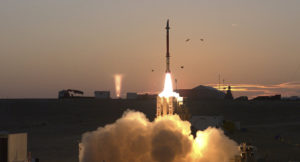
DefenseNews:
US funding for its own missile defense development and Israeli missile defense aid is in competition for limited dollars, a new report from a Washington think tank released Friday finds.
The report from the Center for Strategic and International Studies examined how the Missile Defense Agency’s growing responsibility since its inception in 2002 and the expanding “colors of money” it must juggle to fund programs in research and development, procurement and operations and sustainment has put a strain on the agency, especially as defense spending decreases and budget top lines across the Defense Department are on a downward trend.
But another source of the strain is that foreign assistance to help Israel develop its own missile defense since 2009 has more than quadrupled. “Much of the more recent increase has come from procurement of Israeli systems and interceptors like Iron Dome,” the report states.
Moreover, Congress has consistently increased the Israel funding beyond what the Pentagon has requested over the course of 10 years, but most significantly over the last five, according to a chart comparing budget requests with congressional additions.
The report states that between 1998 and 2012, about 1 to 3 percent of MDA’s budget went toward Israeli cooperative programs. In 2011, that percentage rose to 3.5 during the Israel-Gaza conflict. The funding was devoted to research and development.
In 2014, Israeli missile defense funding took up 9 percent of MDA’s budget. The percentage rose because systems being developed were ready for procurement — mainly for Iron Dome batteries and interceptors.
In 2016, David’s Sling and Arrow were added into the procurement account in addition to Iron Dome.
And none of this accounts for Congressional additions to the budget for Israeli missile defense cooperation. Congress is again poised to funnel more funding in fiscal 2017 into the account beyond what was budgeted. The administration’s request is for $146 million while Congress could bring that amount up to $600.8 million. The House Armed Services Committee’s authorization would increase the budget by $450 million, the largest plus-up among the four congressional defense committees
